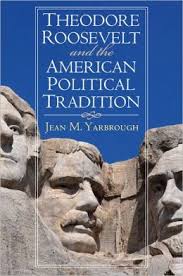Rethinking Roosevelt
Workmanlike history recounts. Good history explains. Outstanding history does all and provokes new thought.
Jean Yarbrough, Gary M. Pendy, Sr., Professor of Social Sciences and Professor of Government and Legal Studies at Bowdoin College, has a new book out: Theodore Roosevelt and the American Political Tradition. Can anything more be said about Colonel Roosevelt? Absolutely, and in this outstanding work, Yarbrough weaves together traditional biography, intellectual history, and astute political analysis. Zeroing in on Roosevelt’s development as a political thinker, Yarbrough makes clear the contradictions between his rhetoric, action, and values. For those of us who have read a lot about and by Roosevelt (and count me among them), Yarbrough’s study is a refreshing analysis that makes clear the thread of radicalism in the founder of the Bull Moose party.
Historians have long found Roosevelt a difficult president to analyze. A leading progressive, he also claimed the mantle of conservative. Embracing the tradition of Hamilton and Lincoln, Roosevelt nonetheless adopted ideas and policies that were extraordinarily anti-Hamilton and anti-Lincoln. Yarbrough traces the evolution of Roosevelt’s thinking on these matters. Hegel, race, and a particular understanding of the law and republican values figure prominently. Yarbrough also shines a light on Roosevelt’s lack of understanding economic thinking and motivation.
It is a lucidly written biography, a book that will be informing and provoking for many years to come.
David Potash